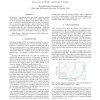Free Online Productivity Tools
i2Speak
i2Symbol
i2OCR
iTex2Img
iWeb2Print
iWeb2Shot
i2Type
iPdf2Split
iPdf2Merge
i2Bopomofo
i2Arabic
i2Style
i2Image
i2PDF
iLatex2Rtf
Sci2ools
63
Voted
ICASSP
2011
IEEE
2011
IEEE
Correlogram template matching for time-delay estimation
We propose a correlogram-based time delay estimation method using signals modeled as the output of the cochlea, where the low-level signal processing happens in the human auditory system. With a normalized correlogram that preserves time-delay patterns that are invariant to speech features such as formants, we employ two-dimensional template matching for time-delay estimation. Experimental results show that our method outperforms a traditional correlogram-based method as well as the GCC-PHAT, especially for short analysis windows in a moderately reverberant environment.
Delay Estimation Method | ICASSP 2011 | Low-level Signal Processing | Signal Processing | Traditional Correlogram-based Method |
| Added | 20 Aug 2011 |
| Updated | 20 Aug 2011 |
| Type | Journal |
| Year | 2011 |
| Where | ICASSP |
| Authors | Bowon Lee, Ton Kalker, Ronald W. Schafer |
Comments (0)

